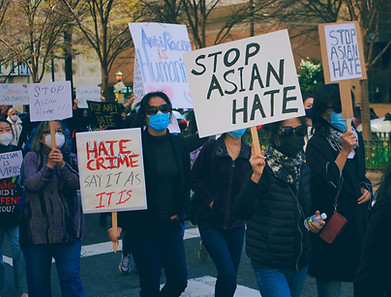

Meet the cast
Video Podcast
AAPI experiences:
A Discussion
Juno Kim January 26th, 2022
Asian American students often face great amounts of pressure from their parents and surroundings to excel academically. With stereotypes such as “tiger moms” and “A for Asian” accompanying the model minority myth, Sumie Okazaki, an NYU psychology professor performed a study on Asian American students and sources of pressure to succeed. The leading source named by students was their parents and family. And so, we asked participants about the academic pressure that they felt due to their culture. While the majority resonated with academic pressure, they also felt that it wasn’t specifically due to their racial background but more centered around their location in the Bay Area and the surroundings of high-achievers.
With the COVID-19 pandemic, hate crimes against Asians spiked for a period of time ranging from verbal harassment to physical assault. From March-December of 2020, the beginning stage of the pandemic, 70.9% of these assaults have been verbal harassment according to the AAPI Hate Reporting Center. As such, Asian Americans have been affected in a wide variety of ways by the pandemic specifically, so we hoped to observe how participants felt their culture played a role in how the pandemic affected their experience.

The Asian American experience is a different one from Asians living in Asia, and even between different geographic locations in America, there are widely different communities with the diverse treatment of Asian Americans. Because of the difference in culture and upbringing, Asian Americans may feel a slight disconnect from their relatives and other family members based in Asia, so we asked our participants how they felt about the potential lack of connection. While the majority agreed that they had a slight disconnect from their relatives, Avi R. stated that he felt extremely connected to his relatives, as he regularly connected with them over call and this was sufficient.
There are often Asian American communities formed with the basis of culture, and friend groups often share backgrounds. So we hoped to see how and if participants felt any pressure to become friends with those who shared their racial background and potentially had the same experience growing up in America. The responses were in unanimous disagreement with the statement, and the reasons were loosely centered around the fact that even though friend groups might contain many individuals from a similar/same cultural background, this was not the basis of forming relationships. Additionally, the participants felt that it was also due to the fact they lived in the Bay Area which has an extremely large number of Asian Americans that will inevitably become friends.
With the recent buzz around cancel culture, especially with cultural appropriation, Asian Americans have a role in standing up to cultural appropriation present around them. With American mainstream media also having an impact on global representation, participants were asked if they felt they were adequately represented in mainstream media. An important difference brought up in the discussion was that even if there was more representation, if it was detrimental or inauthentic, it was inadequate representation. There was a general consensus that while there was an increase in Asian presence in media, there is still work to be done on how Asians are portrayed and keeping culture authentic.

The Asian American experience is unique and has both good and bad sides. To see the thoughts of Gunn students on their experiences of growing up with Asian heritage, listen to Gunn Middle Ground’s podcast: AAPI experience.
Genesis of harmful Asian stereotypes
Resources
Organizations
-
Stop aapi hate:
-
AAPI equity alliance
Research/History




